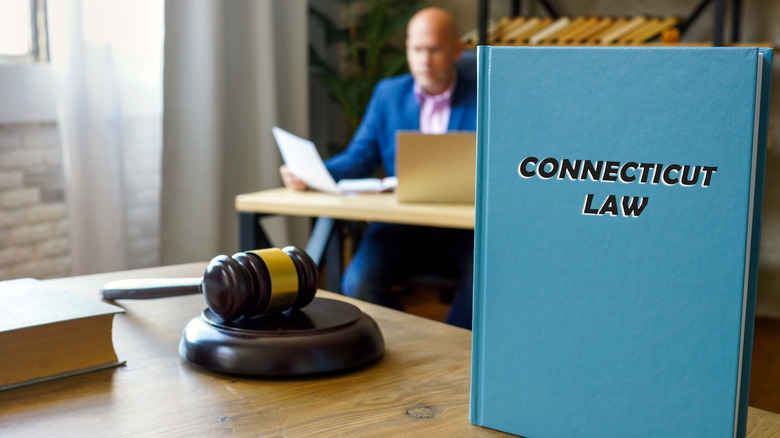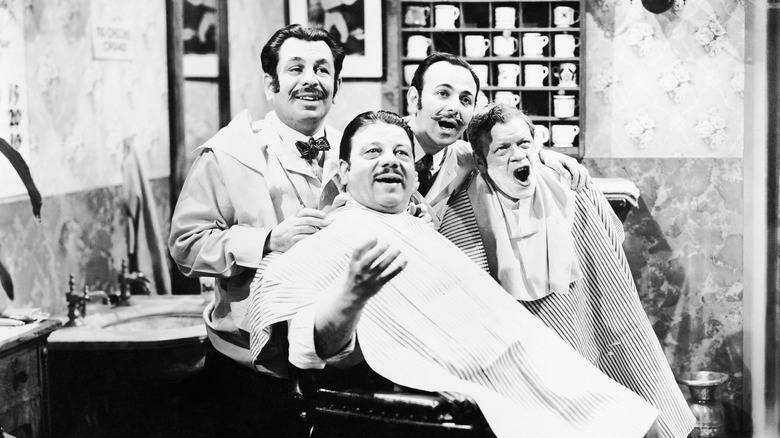Weirdest Laws In Connecticut
Connecticut seems like a pretty sleepy state, right? Filled with apple trees, bedroom communities of New York City, and buttery lobster rolls? Wrong: it is bedlam. The third-smallest state in the country, Connecticut has a system of law and order that makes a compelling argument for total anarchy. If it is not quite a banana republic, maybe it is something close: a nutmeg republic.
Are you scoffing? How, then, do you explain laws like a prohibition on pickles that don't bounce (via Only in Your State)? A law against silly string? A weird law against walking on your hands while crossing the street? The chilling thing is that these laws must have been inspired by real incidents. Is the home of patrician New Englanders like Martha Stewart (per Martha Stewart) and Ethel Kennedy (per John F. Kennedy Presidential Library) secretly the silliest place on the planet? Steel yourself and read on.
The bouncing pickle test
It's something of a myth that there is one specific law that bans pickle sellers from selling spears that don't boing off the ground, according to the Connecticut State Library, but it's a real thing you can get in trouble for in the Nutmeg State. According to Debra Pond, a law reference librarian for the state library, in 1948, pickle packers Sidney Sparer and Moses Dexler were arrested for selling pickles that were "unfit for human consumption."
The state's food and drug commissioner at the time devised a handy way to check whether pickles were fresh: "drop it one foot, and it should bounce." Sparer and Dexler's pickles didn't pass the test (along with several others) and they were fined $500, the maximum penalty allowed by law. So before traveling to New Haven or Bridgeport to sell your dills, cornichons, and bread-and-butters, please perform all appropriate tests to make sure your pickles are up to snuff.
Please walk upright and forward
If there's a ministry of silly walks in Connecticut, it's specifically there to make sure you don't do silly walks. According to the Hartford Courant, in the state's capital of Hartford, you supposedly may not cross the street on your hands, in what would be a cool gymnastics trick. This seems fairly reasonable, all things considered. A little bit more extreme is a law in Devon that reportedly says pedestrians should not walk backward after sunset, according to I95.
The Connecticut law office of Kahan, Kerensky, and Capossela wrote on their blog that the latter law probably developed from early pedestrian safety codes. And, after all, both ways of walking are potentially dangerous. You might not see where you're going if you're going through an intersection backward, or upside-down. It's unclear if anyone actually was charged for either rule, however. It would be a pretty embarrassing thing to admit to your cellmate. "What are you here for?" "Oh, I crossed the street by walking on my hands."
Only serious string here
Silly string is no silly matter in Southington, Connecticut, according to the Hartford Courant. Though many strange laws are from early on in a town's existence, when you may have had to regulate the height of a woman's hat-feather for moral reasons (for example), Southington banned silly string as recently as 1996. Apparently, kids went crazy with the stuff at an Apple Harvest Festival, even using the cans of slimy string to threaten police officers (two officers on motorcycles were nearly run off the road by the stuff).
"This product has no legitimate use," said Police Chief William Perry at the time, to Deseret News. "It's being manufactured and sold with one purpose in mind — to annoy other people."
The silly string at the harvest festival apparently ripped the paint from cars, damaged marching band instruments, and littered the streets and sidewalks. But today the ban just seems, well... silly.
Absolutely no musical hairdressing permitted
If your barber or hairdresser has a song stuck in their head while they're grooming you, they'll just have to keep it to themselves in Waterbury. According to the Hartford Courant, a town edict in the small city forbids beauticians and barbers from singing, humming, or whistling while with a customer.
The Kahan, Kerensky, and Capossela law firm blog claims that experts suspect this regulation came from the church, not the state — many early New England settlements had strict rules around singing and dancing (so when is there going to be a hairdresser version of "Footloose"?). Alternately, the "no music" rule may have been a way to direct customers to legitimate barbershops instead of unsavory institutions that, one imagines, were in a constant state of musical revelry.
It's unclear if this law is at all enforced today, but just to be safe, if hair cutters in Waterbury want to start a barbershop quartet, they'll need to do it during their off hours.
Keep your dogs in a state of ignorance
It's illegal to educate dogs in Hartford, according to the Hartford Courier. This raises a lot of interesting questions, such as, for instance, does training your dog count as educating them? Perhaps the law specifically was enacted to keep dogs from being educated in the art of mauling, pooping in your neighbor's yard, or barking at the mailman. Whatever the intention, it's not in the animal section of the town's code of ordinances today (via Municode Library), so maybe the rule is outdated or simply an urban legend.
But if it really does exist, and is perhaps tucked away in some early town charter, here's one theory: The last thing Hartford wants is for dogs to start reading Rousseau, write some tracts on the "Rights of Dogs," begin holding meetings about their despot owners, etc. It isn't clear if there is a similar rule about cats, so perhaps the government already assumes they're a lost cause; they already know too much.





